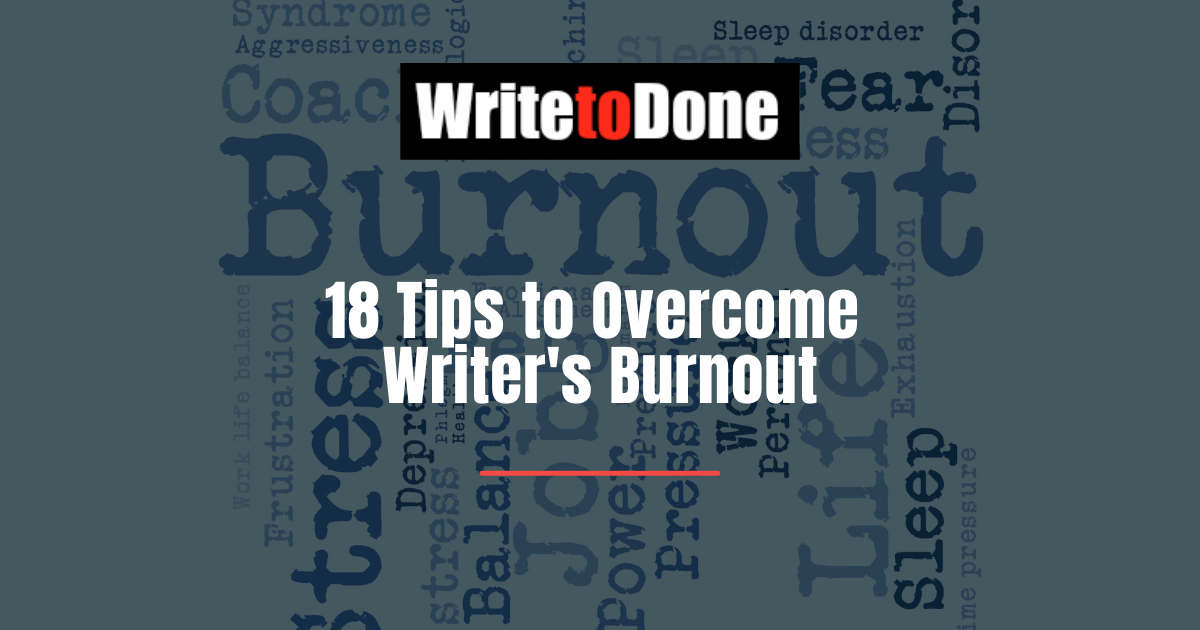Writer’s burnout can be described as severe exhaustion, feeling depleted, running on empty and lack of inspiration and motivation. Frankly, you feel like you don’t give a damn.
You begin doubting your capabilities and the value of your work. Your enthusiasm and energy have vanished. Your ideas have dried up and you fear everything you write isn’t worth publishing.
Understanding writer’s burnout, can help you face your problem and refresh your writing and creativity.
What causes writer’s burnout?
Lack of down time
Feeling overworked and undervalued
Too much responsibility
Lack of monetary rewards for your work
Doing unchallenging or tedious work
Failure to socialize
Consistently working too many hours
Lack of support
Demanding perfection
A negative view of yourself
Unwillingness to delegate
The need to control everything
Feelings of overwhelm
Symptoms can be physical, emotional or behavioral
Physical
Headaches
Poor sleep patterns
Feeling tired
Feeling sick
Emotional
Depression
Lack of energy
Irritability
Disengagement
Lack of motivation and productivity
Loss of meaning and passion
Behavioral
Isolation
Coping with alcohol or drug abuse
Ignoring work and deadlines
“Life is actually really simple, but we insist on making it complicated.” ~Confucius
Steps to Enjoyable Writing
Use the following suggestions to bring the joy back to your writing and other areas of your life.
1. Clear your desk. A cluttered workspace influences your state of mind. A neat and sparse desk will help you stay focused and clear. Keep only the necessities in the open. Find a place for everything else or get rid of it.
2. Mind your own business. Don’t allow other writers to drive you. Don’t make comparisons. There will always be better and worse writers than you. Focus on improving your writing and enjoy the process.
3. Learn to accept constructive criticism. Everyone experiences criticism and rejection. Don’t internalize or take things personally. Improve your work and let the rest go.
4. Read books on writing. Read books on writing for enjoyment. Skip the “how to” exercises therein. See if you can relate to the author. If the author was sitting across from you at dinner what would you talk about? What advice would you want? What questions would you have?
5. Free-writing. If you want to enjoy writing, learn to write for yourself. Find pleasure in your writing, challenge yourself. The purpose of free-writing is to express yourself for your eyes only. It’s very liberating.
6. Chill out. If your bored, stressed or tired, deal with those emotions before sitting down to write. Take a walk. Write in your journal. Clear you head. When you are in a relaxed state begin again. You can’t do your best work when you don’t feel your best.
7. Connect with yourself. When you are tempted to fill up bits of free time with texting, checking emails, Facebook or Twitter, take a few moments to pause and breathe. Breathe in “calm” and breathe out, “peace.”
8. Become unreachable. The world doesn’t end when you disconnect. Take 10 minute breaks throughout your work day and walk away from everything digital. Go outside for a breath of fresh air. Sit silently and gaze out a window and daydream. Anything can be put off for 10 minutes.
9. Decompress and reflect. Take a mental health day, a vacation day or a sabbatical for personal renewal. Spend a day at the beach. Watch the sunset. Check into a bed and breakfast or a hostel in another city. Spend a day in a museum or attend an art fair. Choose to do something unrelated to writing. It’s a great way to silence your inner writing critic.
10. Empty your brain. Do a mind dump by writing down everything that comes to mind on paper. Write down dreams, goals, memories, random thoughts, ideas, everything. Do this for fifteen minutes. Next, read over your list and look for future topics and ideas for your writing.
11. Mix it up. If you currently like to write essays experiment with list or how-to articles. Write about your personal experiences. Change the tone of your articles, be conversational, revealing, funny, silly or serious. Make experimenting fun.
12. Communicate. Seek help and support from a therapist, coach, a friend or family member. Explore your problem area and do what it takes to prevent burnout from happening again. A second party can help you turn things around and prevent future burnout.
13. Diet and lifestyle changes. Avoid sugar and caffeine. Drink enough water and get adequate sleep. Take nutritional supplements. Learn to meditate or schedule a massage.
14. Make exercise fun. Do what you enjoy. Partner with a friend to dance, walk, or bike. Get outside and move. Hiking to the top of a mountain can feel like you’ve conquered the world!
15. Expand your mind. Learn new things. Study a second language, read about great philosophers, and everyday heroes. Avoid depressing news both online and off.
16. Find quality time for the important people in your life.Take your brother out for dinner or attend the symphony with a neighbor. Play board games with close friends. Meet your mentor at a favorite coffee shop on Saturday morning. Never underestimate the power of creating good times with the people you love.
17. Slow down and be of service to others. Send a distant relative a hand written note, talk to a lonely neighbor, send flowers to someone special, make a meal for someone who is ill. When you get out of our own story and help others you keep life in perspective.
18. Change your scenery. J.K. Rowling wrote her first Harry Potter book in a cafe near her flat in Edinburgh. Natalie Goldberg recommends writing in coffee shops and restaurants. It’s easy to get distracted by the household chores, the refrigerator, and television when you work and write from home.
Be gentle on yourself. Remember there is no end to self-care and creativity. When you write for love and with conviction, joy leaps from every page.
















